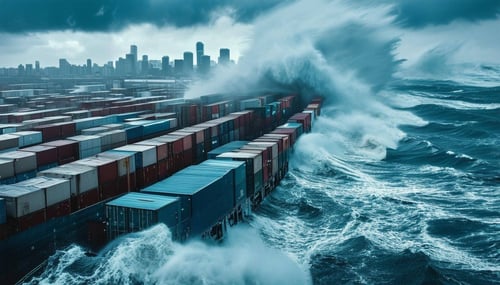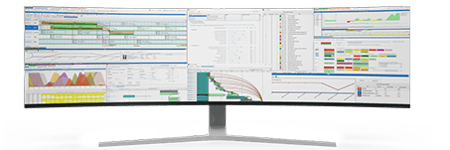Leveraging AI to Optimize Supplier Relationship Management in Medical Manufacturing Facilities
Discover how integrating AI solutions like PlanetTogether with ERP systems revolutionizes supplier management in medical manufacturing.
Learn supply chain lessons from recent hurricanes and how integrating PlanetTogether with ERP systems like SAP or Oracle builds resilience in medical manufacturing.
In recent years, hurricanes have increasingly disrupted global supply chains, impacting production, logistics, and the timely delivery of critical goods. For supply chain managers in the manufacturing industry, these disruptions have highlighted vulnerabilities that require both immediate attention and long-term strategies. The lessons from these natural disasters are crucial, especially when you consider the delicate nature of medical supplies, the critical timelines, and the potential life-saving impact of timely deliveries.
One of the key takeaways from recent hurricanes is the importance of advanced planning, real-time visibility, and data-driven decision-making.
This blog explores how integrating advanced planning and scheduling (APS) systems like PlanetTogether with enterprise resource planning (ERP) systems such as SAP, Oracle, Microsoft Dynamics, Kinaxis, or Aveva can help supply chain managers enhance resilience and adapt to the inevitable disruptions brought by hurricanes and other natural disasters.

Hurricanes create a wide range of challenges for supply chains. In medical manufacturing, these challenges are particularly severe due to the need for precise coordination between raw material suppliers, manufacturing operations, and distribution channels. When a hurricane strikes, supply chain managers face disruptions in various areas:
These disruptions are unpredictable and can occur at any point in the supply chain. The ability to react quickly, reroute resources, and communicate with all stakeholders in real time is critical for minimizing the impact.
![]()

An integrated approach to supply chain management is essential in mitigating the effects of hurricanes. Here’s where supply chain technologies like PlanetTogether APS come into play. PlanetTogether is a powerful APS system that helps manufacturers optimize production schedules, balance workloads, and maximize resource utilization. But to fully leverage its capabilities, integrating it with other enterprise systems such as SAP, Oracle, Microsoft Dynamics, Kinaxis, or Aveva is critical.
Integration between an APS like PlanetTogether and an ERP system enables seamless communication across departments, real-time data sharing, and more accurate planning. This becomes especially important when dealing with disruptions caused by hurricanes, where real-time decision-making and adaptability are crucial.
For example, when a hurricane disrupts the supply of raw materials, having an integrated system allows you to quickly assess the situation, identify alternative suppliers, and adjust production schedules accordingly. Without this integration, it would be difficult to react swiftly and efficiently, leading to longer downtimes and potentially higher costs.

One of the biggest lessons from recent hurricanes is the need for real-time visibility across the entire supply chain. Knowing exactly where your raw materials are, how much inventory is available, and the status of transportation networks is critical for making informed decisions.
When PlanetTogether is integrated with ERP systems like SAP or Oracle, supply chain managers gain access to real-time data on inventory levels, production schedules, and supplier performance. This real-time data is crucial when a hurricane is approaching, as it enables quick assessment of potential risks and the ability to make proactive adjustments.
For example, if a key supplier’s facility is in the path of a hurricane, the system can flag potential delays, allowing the supply chain manager to source materials from alternative suppliers. Similarly, if a production facility is at risk of shutting down, the system can automatically adjust production schedules to minimize disruption.
Integrating PlanetTogether with Kinaxis or Microsoft Dynamics enhances demand planning capabilities during hurricanes. Kinaxis, for instance, offers strong demand sensing features, which can be crucial during a crisis when there are sudden spikes in demand for medical supplies, such as PPE, medications, or medical devices.
By integrating these platforms, companies can create predictive models that simulate different hurricane scenarios. This allows supply chain managers to preemptively adjust orders and production schedules based on anticipated needs, ensuring that stock levels remain balanced even as demand fluctuates wildly during and after the storm.

Hurricanes often force supply chain managers to pivot quickly. Production facilities may have to shut down or reduce capacity due to evacuations or damage, and transportation routes may be blocked, leading to delays. Flexibility and agility in production scheduling become essential to maintain operations.
PlanetTogether excels in providing dynamic, real-time production scheduling, which becomes a game-changer during disruptions. When integrated with ERP systems like Oracle or SAP, it allows you to make rapid adjustments to production schedules. These platforms offer finite capacity scheduling, ensuring that production plans are feasible given the current constraints such as available workforce, machine capacity, or material shortages.
For instance, if a hurricane causes a delay in material delivery, the system can automatically reschedule production to ensure that the most critical products—such as ventilators or other life-saving medical devices—are prioritized. It can also adjust for shifting demand by reallocating production resources to meet the increased need for certain products.
This level of flexibility reduces downtime and ensures that manufacturing processes can continue, even under constrained conditions.
For companies utilizing Aveva in their supply chain operations, integration with PlanetTogether offers a unique advantage by improving operational visibility. Aveva’s strengths in asset performance management combined with PlanetTogether’s scheduling capabilities ensure that supply chain managers have complete visibility over both production and maintenance schedules. During a hurricane, this can be vital for coordinating repairs and ensuring minimal downtime in critical facilities.

During hurricanes, timely and clear communication across all tiers of the supply chain is critical. Disjointed or delayed communication can exacerbate delays, leading to shortages or overproduction of non-essential goods.
By integrating PlanetTogether with an ERP system like SAP or Oracle, companies can ensure better communication and collaboration across the supply chain. These systems act as a single source of truth for all stakeholders, from suppliers to production managers to logistics teams.
When hurricanes threaten to disrupt the supply chain, these platforms enable:
Cloud-based solutions like Microsoft Dynamics and Kinaxis further enhance this collaboration by providing access to critical information from any location. When a hurricane hits, supply chain managers may not always be able to operate from their regular offices or control rooms. Cloud-based systems allow them to access supply chain data remotely, ensuring continuity in communication and decision-making regardless of physical location.

Hurricanes are unpredictable, but supply chain managers can reduce their risk exposure by preparing for various scenarios. Having the right tools in place for scenario planning is essential in mitigating risk and ensuring business continuity.
PlanetTogether, when integrated with ERP systems like SAP or Oracle, enables supply chain managers to perform advanced scenario planning. This allows them to model different hurricane scenarios—such as a facility shutdown, transportation delays, or supplier disruptions—and see how these scenarios would impact production and delivery timelines.
By leveraging the data within these systems, managers can simulate the impact of various disruptions and develop contingency plans. This kind of what-if analysis is invaluable in ensuring that the supply chain remains agile and responsive, even in the face of significant challenges.
When integrated with Kinaxis or Microsoft Dynamics, PlanetTogether allows for the development of preemptive strategies that can be deployed as soon as a hurricane is forecasted. For example, companies can model the impact of a hurricane on a key supplier’s facility and preemptively order materials from secondary suppliers. Similarly, they can adjust production schedules to ensure that critical products are manufactured before the hurricane strikes.
This proactive approach can significantly reduce the impact of a hurricane on the supply chain, minimizing delays and ensuring that critical medical supplies reach those who need them most.
As hurricanes and other natural disasters become more frequent and severe, supply chain managers in medical manufacturing must take steps to build resilience into their operations. The lessons learned from recent hurricanes underscore the need for real-time visibility, flexible production scheduling, enhanced collaboration, and robust scenario planning.
By integrating advanced planning and scheduling systems like PlanetTogether with ERP platforms such as SAP, Oracle, Microsoft Dynamics, Kinaxis, and Aveva, supply chain managers can ensure that they are prepared for the worst. These integrated systems provide the tools needed to make informed decisions quickly, adapt to disruptions, and maintain continuity in the face of extreme weather events.
In a world where timely delivery of medical supplies can save lives, the ability to navigate through supply chain disruptions caused by hurricanes is not just a competitive advantage—it’s a necessity. Embracing technology and integration is the first step in building a resilient, agile, and future-proof supply chain.
As a supply chain manager in the medical manufacturing industry, it’s time to assess your current operations and consider how integrating tools like PlanetTogether with your ERP system can strengthen your ability to handle the next hurricane or disaster.
Are you ready to take your manufacturing operations to the next level? Contact us today to learn more about how PlanetTogether can help you achieve your goals and drive success in your industry.
Discover how integrating AI solutions like PlanetTogether with ERP systems revolutionizes supplier management in medical manufacturing.
Learn how integration between PlanetTogether and ERP, SCM, and MES systems strengthens proactive risk monitoring for pharmaceutical supply chains.
Discover how integrating AI-driven risk management with leading ERP systems fortifies chemical supply chains for resilience and success.
Be the first to know about new B2B SaaS Marketing insights to build or refine your marketing function with the tools and knowledge of today’s industry.